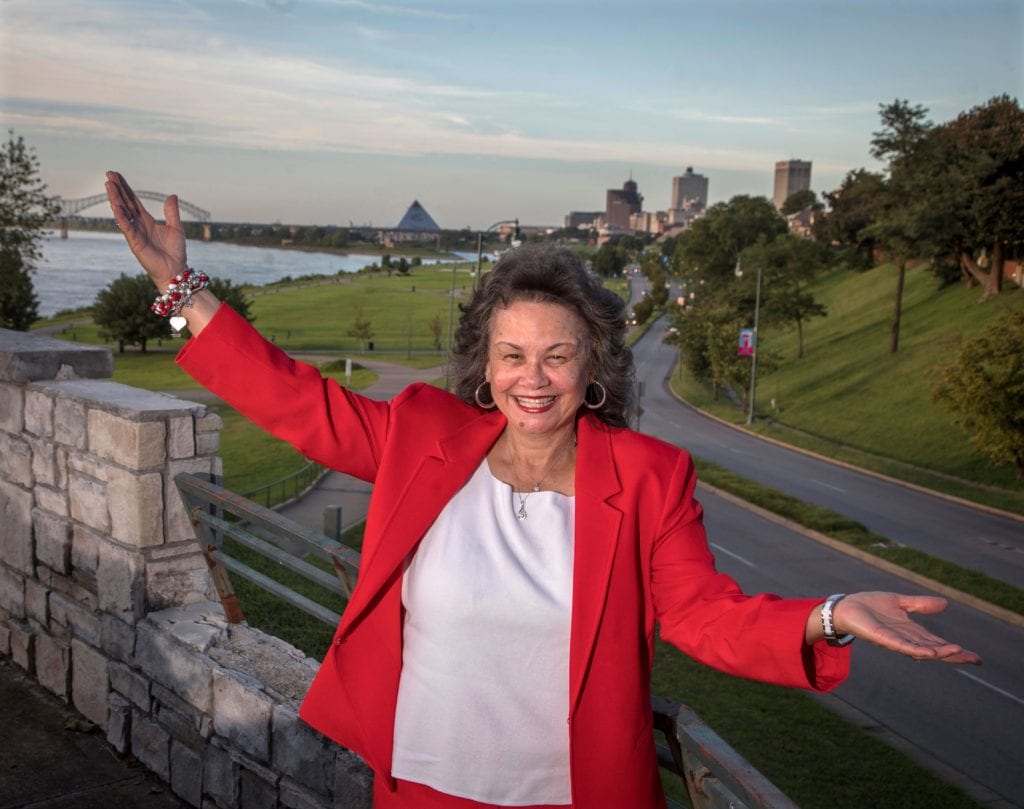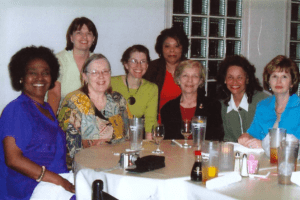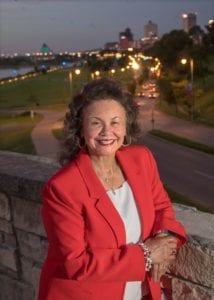
For Evelyn Collins, the 29-year study of Nurse-Family Partnership mothers and their children in Memphis, Tenn., is not merely a rigorous randomized, clinical trial, rich with sophisticated insights from scientists and packed with valuable data.
“It is my career,” she said.

A social worker who was hired in 1990 to recruit women for the study, Evelyn took charge of the research and formed warm relationships with many of its participants. “I don’t look at this as a job,” she said. “I kind of look at it as a calling.”
The Memphis clinical trial was designed to determine how Nurse-Family Partnership affected African-American moms and their babies in an urban area. Over the years as program coordinator, Evelyn has followed over 700 families in the trial and it has an extraordinary 90 percent retention rate.
Dr. David Olds, founder of Nurse-Family Partnership, said he remembers meeting Evelyn in 1990 and has worked with her often as she has coordinated the study staff and all of the work in the Memphis office. But her job description doesn’t begin to convey the importance of the role she has played in the project.
«EVELYN IS IN SO MANY WAYS THE LIFE OF THE STUDY. EVERYTHING HAS FLOWED THROUGH HER.»
– Dr. David Olds, founder of Nurse-Family Partnership
Her extraordinary talent is her ability to build trusting relationships with the often-skittish study participants.
“There is a natural apprehension on the part of African-Americans in particular about participating in research because of the way researchers in the past have failed to treat them in the most ethical way,” said Olds. “Evelyn has done a remarkable job of reassuring them and maintaining contact with them. She brings incredible respect for the study participants to the work with her caring, ongoing engagement.”

When the Memphis study began, Evelyn was dispatched to health care facilities across the city to enlist women who were about to become mothers for the first time. Some were as young as 13 or 14, some as old as their late-20s or early 30s. Educational achievement or marital status were not factors in their selection.
Even with a modest financial incentive for participants, the work was not easy.
“Recruitment was a little more difficult than I thought it would be,” Evelyn said, so she decided she had to find ways to connect with the mothers on a personal level. She approached them as a friend.
“It ended up that I became attached to some of the ladies I recruited. They would look for me when they came in for interviews. The ladies would give me a hug,” she said. “One of the children came in and said to me, ‘I remember you. You were that lady in the office when I was little and played with the Playdoh.’
“They would feel more comfortable with the interviewers because they knew me,” Evelyn said.
The findings from the Memphis study have been significant and provide valuable data for communities interested in initiating or expanding Nurse-Family Partnership programs.
The research found that women who received support through Nurse-Family Partnership were less likely to have hypertensive disorders during pregnancy; less likely to die of any cause during the 20-year period after the birth of their first child; less likely to die of suicide, homicide or drug overdoses; and less likely to need public assistance throughout their lives. Their children, meanwhile, were less likely to have serious injuries requiring hospitalization in the first two years of life; less likely to die of preventable causes such as injury, sudden infant death syndrome or homicide; more likely to reach higher levels of academic achievement; and had fewer developmental problems.
 These outcomes are of unquestionable public health importance,” Olds said. “And in the most fundamental sense, the success of the Memphis research has depended on Evelyn’s outstanding work.”
These outcomes are of unquestionable public health importance,” Olds said. “And in the most fundamental sense, the success of the Memphis research has depended on Evelyn’s outstanding work.”
Evelyn said that understanding African-American culture was key.
“Black women usually tend to lean toward doing what their mothers or grandmothers say,” she explained. “For me growing up, whatever my mama said was the bible. I was impressed that the nurses were able to have such a big influence on so many lives.” Evelyn saw how many young mothers – with the encouragement from nurses – quit smoking, left bad relationships, managed their health, earned college degrees, postponed second pregnancies and found good jobs.
“They help the ladies find housing and clothing and help them get an education. They would help other family members with such things as managing their blood pressure. Mostly, they helped the ladies feel good about themselves.”
Evelyn maintains contact with the study participants by sending greeting cards for birthdays and holidays. She scans newspapers each day to check on home sales and divorces to see if participants might have new addresses.
“A lot of people are surprised I’m still here,” she said. “I want them to know we still want to be part of their lives.”
Olds said that Evelyn’s work and her “genuine caring” demonstrate “the very best of what people involved in research should exhibit.”
And while Evelyn is a skilled social worker, it’s her profound empathy that is her greatest asset. It was apparent even when she was a child.
“When I was growing up in a low-income neighborhood, there was one family where the kids were struggling,” she recalled. “They needed a lot of help all around.”
With their mother’s permission, Evelyn and her sister offered to tutor one of the children in history and math and they noticed that the young girl’s hair was unwashed and unkempt.
“I didn’t want to hurt her feelings, but one day I suggested that we wash our hair together. It really worked. We became really close and I gave her some of my clothes.
“I realized then that I like helping people and making them feel good.”
When Olds heard the story, he was heartened, but not surprised.
“I can’t imagine a better person to run the Memphis study,” he said. “She has always done her work with rigor, respect and caring.
“Isn’t it amazing when you discover people who invest their lives in research and care so much.”
Evelyn is proud of her work with Nurse-Family Partnership.
“It’s the lives of the moms and their children that actually sell this program. It’s their enthusiasm. It’s exciting for me to see them and how they’ve grown and changed.
“It’s so much more than a job,” she said. “It’s part of me.”

